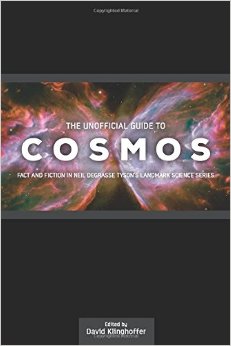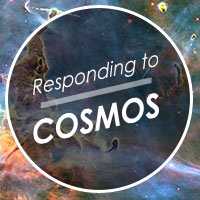 Education
Education
 Evolution
Evolution
 Faith & Science
Faith & Science
Separating Fact from Fiction: New Book, The Unofficial Guide to Cosmos, Released Today
 The other day one of our kids, age seven, came home from school with a garbled account of what he had learned about the moon by watching an episode of "Bill Science Guy." He meant Bill Nye the Science Guy. He went on to talk about how he also learned that "Back a long time ago, everyone thought the world was square. And this guy, he said it was round? So they burned him."
The other day one of our kids, age seven, came home from school with a garbled account of what he had learned about the moon by watching an episode of "Bill Science Guy." He meant Bill Nye the Science Guy. He went on to talk about how he also learned that "Back a long time ago, everyone thought the world was square. And this guy, he said it was round? So they burned him."
I’m not sure what that was in reference to — some kind of a mash-up between Giordano Bruno and Christopher Columbus, perhaps? Further querying elicited no additional information.
I bring this up, in any event, to remind you of three things.
First, teachers love kid-friendly video science supplements like Bill Nye’s five seasons of programs from the 1990s, for a younger audience, as they will love Neil deGrasse Tyson’s 13-episode materialist instructional course Cosmos for teen viewers.
Second, you never quite know what is going to lodge in your kid’s mind from these programs. It may be something interesting and factual. Or in the case of Cosmos and Dr. Tyson, it may be your child’s rendition of a propaganda point, fitting the agenda of Cosmos to dissuade viewers from thinking life is at all touched by a special purpose and destiny, and to convince them instead that anybody who does invest existence with such meaning is out to stop science and burn people. What gets stuck in your kid’s memory may be even more problematic than what was in the science video to begin with.
Third, programs like Bill Nye and Cosmos will be with us in classrooms for decades to come. They are not going away. The episode my son watched is from more than twenty years ago.
That’s why, as you know, parents need to be active and involved in their kids’ education, staying abreast of what they’re learning and contributing an alternative, critical perspective as needed.
 Which brings us to today’s news. Our book The Unofficial Guide to Cosmos: Fact and Fiction in Neil deGrasse Tyson’s Landmark Science Series is out now. I’m proud to have been the editor on the project.
Which brings us to today’s news. Our book The Unofficial Guide to Cosmos: Fact and Fiction in Neil deGrasse Tyson’s Landmark Science Series is out now. I’m proud to have been the editor on the project.
See here for the Table of Contents and here for the website, including a sample chapter, "When Ideology Trumps Science: Neil deGrasse Tyson and Cosmos on Global Warming," by our Discovery Institute colleague Dr. Jay Richards.
Most of the material was first published at Evolution News & Views, but it is all freshly edited and handsomely and conveniently presented under one cover. Jay Richards, Casey Luskin, and I critique each episode of Cosmos in detail, and prominent attorney Douglas Ell contributes a new concluding chapter on "Responding to Cosmos: Why It Matters."
Our purpose, as the subtitle says, was to help viewers separate fact from fiction in the series. The book is well timed, too. In a nice serendipity, just as we were finishing up production, other commentators (led by Sean Davis at The Federalist) caught on to how Tyson, "a giant of the popular-science world, … appears to have a penchant for exaggerating or even just making things up."
Being a parent today can be a pain in the neck, I know. I don’t recall my mom or dad ever needing to get involved in checking up on what I was being taught in school, or that I was completing assignments, showing up on time, anything like that. Kids were assumed to be mature enough to transact business with teachers directly, minus parent oversight.
Today, I find that teachers fully expect parents to be right in there with the student, all but attending classes with them. One of our kids had a teacher who sent homework assignments by email to the parents, not to the kids! The parent had to then forward the email and communicate the assignment to the student. It’s routine that a school now expects parents to keep up to date with homework by going online to the school’s website and monitoring your child’s daily performance.
The omnipresence of computers in grade school has been a huge mistake, something that will be recognized in the future, I predict. The downside of it is that kids are infantilized, parents add a further responsibility to their day, and, much worse, young people are continually tempted by the whole Internet’s worth of garbage. How teachers and parents could be so supremely na�ve as to thrust this stuff into kids’ hands, and insist that everyone else do so as well, I do not know.
The flipside, the good part, of all this is that teachers should not be surprised if, in using Cosmos in the classroom, they find that thoughtful parents are supplementing Tyson’s atheist sermonizing with critical examinations like the ones in our book, pointing out the materialist fictions in the series.
When kids start talking back and raising informed questions — Did the Catholic Church really burn a scientist to death for teaching that the Earth goes around the sun? Does science really prove that Earth has no special place in the universe? Are climate-change skeptics really like Nazis? — teachers will need to respond. And just let them try. Now that is one class I would like to sit in on!
Really, and let me emphasize this, Cosmos is not appropriate for public schools, where you’re not supposed to advocate any religion, including atheism. But if instructors insist on using it, a careful teacher should read our book on his own time, for background and for balance. If teachers don’t think of that, parents should suggest it to them.
